Deductive arguments - Study guides, Class notes & Summaries
Looking for the best study guides, study notes and summaries about Deductive arguments? On this page you'll find 848 study documents about Deductive arguments.
Page 2 out of 848 results
Sort by
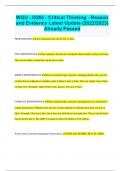
-
WGU - D265 - Critical Thinking - Reason and Evidence Latest Update (2022/2023) Already Passed
- Exam (elaborations) • 20 pages • 2023
- Available in package deal
-
- $9.99
- 2x sold
- + learn more
WGU - D265 - Critical Thinking - Reason and Evidence Latest Update (2022/2023) Already Passed PROPOSITIONS Are statements that can be true or false NON-PROPOSITONS Are sentences that are not statements about matters of fact or fiction. They do not make a claim that can be true or false. SIMPLE PROPOSITIONS Have no internal logic structure, meaning whether they are true or false does not depend on whether a part of them is true or false. They are simply true or false on their own. (Example: Har...
Inductive Vs Deductive Arguments questions verified with 100% correct answers
Inductive Vs Deductive Arguments questions and answers latest 2023 - 2024 [100% correct answers]
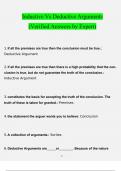
-
Inductive Vs Deductive Arguments (Verified Answers by Expert) questions and answers} (2022/2023) (verified answers)
- Exam (elaborations) • 16 pages • 2023
- Available in package deal
-
- $9.49
- + learn more
Inductive Vs Deductive Arguments (Verified Answers by Expert) questions and answers} (2022/2023) (verified answers)

-
D265 - WGU - Critical Thinking - Reason and Evidence COMPLETE QUESTIONS AND ANSWERS 2023
- Exam (elaborations) • 11 pages • 2023
-
- $10.49
- 1x sold
- + learn more
D265 - WGU - Critical Thinking - Reason and Evidence COMPLETE QUESTIONS AND ANSWERS 2023 1. PROPOSITIONS: Are statements that can be true or false 2. NON-PROPOSITONS: Are sentences that are not statements about matters of fact or fiction. They do not make a claim that can be true or false. 3. SIMPLE PROPOSITIONS: Have no internal logic structure, meaning whether they are true or false does not depend on whether a part of them is true or false. They are simply true or false on their own....
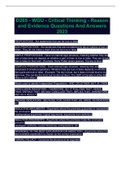
-
D265 - WGU - Critical Thinking - Reason and Evidence Questions And Answers 2023
- Exam (elaborations) • 9 pages • 2023
-
- $10.99
- 2x sold
- + learn more
PROPOSITIONS - Are statements that can be true or false NON-PROPOSITONS - Are sentences that are not statements about matters of fact or fiction. They do not make a claim that can be true or false. SIMPLE PROPOSITIONS - Have no internal logic structure, meaning whether they are true or false does not depend on whether a part of them is true or false. They are simply true or false on their own. (Example: Harry Potter wears glasses. The sky is blue.) COMPLEX PROPOSITIONS - Have internal l...
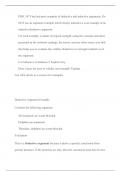
-
PHIL 347 Find and post examples of deductive and inductive arguments. Do NOT use an argume
- Summary • 3 pages • 2024
-
- $7.99
- + learn more
PHIL 347 Find and post examples of deductive and inductive arguments. Do NOT use an argume PHIL 347 Find and post examples of deductive and inductive arguments. Do NOT use an argument example which clearly indicates it is an example of an inductive/deductive argument. For each example, evaluate its logical strength, using the concepts and ideas presented in the textbook readings, the lesson, and any other source you find that helps you to evaluate the validity (deductive) or strength (inductiv...
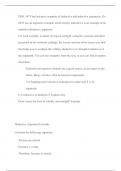
-
PHIL 347 Find and post examples of deductive and inductive arguments. Do NOT use an argume
- Summary • 3 pages • 2024
-
- $7.99
- + learn more
PHIL 347 Find and post examples of deductive and inductive arguments. Do NOT use an argume PHIL 347 Find and post examples of deductive and inductive arguments. Do NOT use an argument example which clearly indicates it is an example of an inductive/deductive argument. For each example, evaluate its logical strength, using the concepts and ideas presented in the textbook readings, the lesson, and any other source you find that helps you to evaluate the validity (deductive) or strength (inductiv...
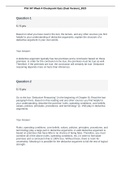
-
Phil 347 Week 4 Checkpoint Quiz (Dual Version)_2023
- Exam (elaborations) • 10 pages • 2023
-
- $8.72
- 1x sold
- + learn more
Question 1 5 / 5 pts Based on what you have read in the text, the lecture, and any other sources you find helpful to your understanding of deductive arguments, explain the structure of a deductive argument in your own words. Your Answer: A deductive argument typically has two premises and a conclusion based on those premises. In order for the conclusion to be true, the premises must be true as well. Therefore, if the premises are true, the conclusion will certainly be true. Deductive re...
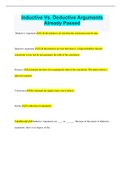
-
Inductive Vs. Deductive Arguments Already Passed
- Exam (elaborations) • 16 pages • 2023
- Available in package deal
-
- $9.49
- + learn more
Inductive Vs. Deductive Arguments Already Passed Deductive Argument if all the premises are true then the conclusion must be true. Inductive Argument if all the premises are true then there is a high probability that the conclusion is true, but do not guarantee the truth of the conclusion. Premises constitutes the basis for accepting the truth of the conclusion. The truth of these is taken for granted. Conclusion the statement the arguer wants you to believe Sorites A collection of arguments...

How did he do that? By selling his study resources on Stuvia. Try it yourself! Discover all about earning on Stuvia


![Inductive Vs Deductive Arguments questions and answers latest 2023 - 2024 [100% correct answers]](/docpics/3234136/64d6b9485eae2_3234136_121_171.jpeg)

